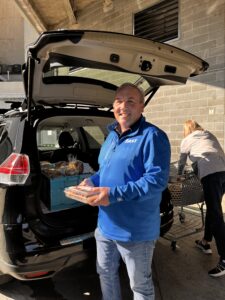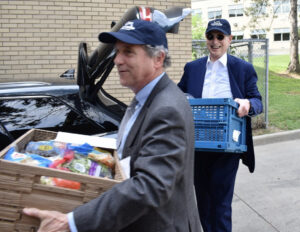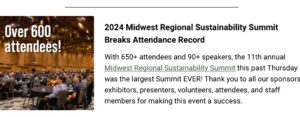Project Overview
Commodities
Practices
- Sustainable Communities: analysis of personal/family life, community services, food access and security, food loss and waste recovery/reduction, leadership development, local and regional food systems, quality of life, social psychological indicators
Proposal abstract:

Volunteer rescues from Trader Joe[/caption]
Last Mile Food Rescue’s (Last Mile) innovative model aims to keep fresh, desirable food out of landfills by rescuing surplus food from establishments like grocery stores, hospitals, stadiums, and convenience stores, and redistributing it to agency partners who serve the food insecure. This process of upcycling donated food waste is a preferred solution on the EPA’s Wasted Food Scale.
Each year, over 700 Last Mile volunteers are directed using a mobile app to pick up food at locations throughout the Greater Cincinnati region and drop it off at over 100 recipient agencies, including shelters, soup kitchens, and pantries. These recipient partners then provide the food to the region’s food-insecure population.
In 2024, Last Mile’s goal is to grow the amount of food kept out of landfills by 25%, rescuing a total of 4 million pounds of food. This follows a nearly 30% growth in pounds rescued from 2022 to 2023. Reaching this milestone will significantly reduce the amount of food dumped, thereby reducing greenhouse gases, while impacting the lives of the most vulnerable, including more than 80,000 food-insecure children across the counties served. Beyond 2024, Last Mile has the bold ambition to scale operations to rescue 6 million pounds of food annually by 2027. Last Mile cannot meet this goal without continued strategic investments as well as educational programs and training opportunities for food donors. The focus must be on attracting and retaining additional food donors needed to reach the food rescue goal. Funds would support the recruitment of new food donors, their onboarding, training, and ongoing support designed to retain them long-term.
Additionally, Last Mile is partnering with two local agencies to achieve these goals:
1. Hamilton County ReSource (ReSource) - the County agency responsible for ensuring that the County achieves state-mandated goals for recycling and waste reduction.
2. Green Umbrella - the region’s climate collaborative.
Together, these two agencies in coordination with Last Mile, will create training programs to educate businesses and individuals in Southern Ohio on the importance of eliminating food waste.
With a combination of this education and training, as well as strategically focused work with food donors, Last Mile believes it can reduce food waste by an additional 2 million pounds annually, totaling 6 million pounds per year, reduce CO2 emissions by 3.24 million pounds total, per year and serve as a model for other regions to learn from as they seek to solve their own food insecurity challenges.
With these objectives in mind, Last Mile respectfully requests $641,371 to directly support its strategic expansion efforts and its training and education partnership with ReSource and Green Umbrella.
Project objectives from proposal:
-
[caption id="attachment_1115216" align="alignnone" width="300"]
 Senators Sherrod Brown and Ron
Senators Sherrod Brown and Ron
Wyden Delivering Food they rescued from Kroger with Last Mile. [/caption] [caption id="attachment_1115794" align="alignnone" width="300"] Green Umbrella 2024 Sustainability
Green Umbrella 2024 Sustainability
Summit[/caption] Eliminate Food Waste- Increase Last Mile Food Donors (by 20%)
- Increase Food Donor Retention through streamlined processes and dedicated staff
- Educate the region on strategies to reduce food waste
- Deploy Training Activities Across the Greater Cincinnati
Region- Plan and Host Two Food Waste Summits:
- Host two Food Waste Summits in the Greater Cincinnati region (2025, 2027) with 300 participants each.
- Focus on the tri-state region of KY, IN, and OH.
- Invite experts and practitioners from across the Midwest and Appalachian regions.
- Emphasize connecting various audiences, including producers, value-added and retail businesses, wholesale procurement, food rescue and redistribution partners, and retail consumers.
- Plan and Host Six Short-Form Trainings:
- Conduct six short-form trainings about food loss and waste reduction through the Regional Climate Collaborative (2026).
- Target institutional members across sectors, including businesses, educational institutions, local governments, and nonprofit organizations.
- Produce and Distribute a Toolkit:
- Develop a toolkit defining best practices in food waste prevention, donation, and upcycling.
- Share resources developed for and presented at the Summits and the short-form trainings. Update the toolkit after each Summit.
- Create and Launch a Public Education Campaign:
- Develop a public education campaign about food waste reduction, primarily through prevention and upcycling.
- Aim the campaign at household consumer audiences (2026).Through increased awareness, the region will support the reduction of food waste and promote food rescue on a larger scale.
- Plan and Host Two Food Waste Summits: